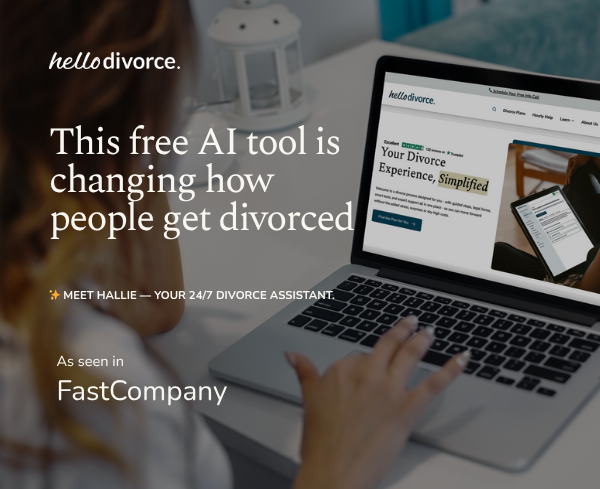Who Gets The House In Divorce? How Do You Split The Value? Do I Need To Sell?
Our Home Equity Buyout Calculator can answer most of these questions and provide multiple options to split your equity in your divorce. Or speak with a Divorce Real Estate Expert to get answers directly.
Hear from clients how we helped them with their largest financial asset.
Compassionate, patient, and forward-thinking. Helped me work through difficult scenarios and understand how to best protect our long-term stability. Support gave me clarity when everything else felt overwhelming.
Real Stories, Real Results.



Timeline
A step-by-step guide to your marital home
Depending on your financial situation you could have options and our team can help provide clarity.
Get Divorce Answers 24/7 with Hallie our DivorceGPT
Hallie is trained exclusively on the Hello Divorce knowledge base so you can feel confident that all the information shared with you has been carefully collected and curated by real people who are researching each state and county's legal requirements.

Understand your options and split your home value with confidence.
 Equity Split Calculator
Equity Split Calculator
Answer simple questions, then our expert-designed software instantly delivers an immediate analysis of your options.
 Speak With Divorce Real Estate Expert
Speak With Divorce Real Estate Expert
After providing information about your real estate, our experts will help you understand all your options.
 Stay, Sell Home, Get A Loan, And More
Stay, Sell Home, Get A Loan, And More
Our team of Divorce Real Estate Experts can help guide you every step of the way based on what option you choose to split the value of your home.
I've already hired an attorney, what can the real estate program do for me? keyboard_arrow_down
Yes, you can absolutely use our real estate program even if you have an attorney! Our real estate services complement your legal representation. We can help by providing a free consultation with our real estate expert to understand your options for the marital home, access to specialized tools for analyzing property division scenarios, and connections to our network of divorce-savvy real estate professionals.
Your attorney can focus on the legal aspects while we help you:
- Evaluate different options for your property (selling, buyout, etc.)
- Calculate accurate equity splits and buyout amounts
- Connect with real estate agents who specialize in divorce sales
- Access our Homesplit software for streamlined property division
- Get support with post-divorce real estate planning
Plus, if you end up working with one of our real estate partners, you could receive a bonus between $500-$7,200 at closing, depending on the partner and services used.
How are you different than a typical real estate brokerage? keyboard_arrow_down
Our approach includes:
* All-in-one divorce support that combines real estate solutions with legal guidance
* Creative solutions for dealing with high interest rates and complex financial situations
* Access to expert connections without being tied to specific banks or brokerages
* Focus on finding deals and rebates to help you save money when you need it most
* Honest, empathetic guidance based on your specific goals and circumstances
We're not here to just sell homes - we're here to help you understand all your options and their implications during this transition.
I'm just thinking about divorce as a homeowner, how can you help? keyboard_arrow_down
1. Expert Home Value Assessment
- Help you understand your home's current market value
- Calculate available equity
- Evaluate mortgage options
2. Custom Solutions
- Explore whether keeping or selling makes sense for your situation
- Review buyout possibilities
- Analyze refinancing options
- Create timelines that work for your transition
3. Financial Planning Tools
- Access to our HomeSplit calculator to explore different equity division scenarios
- Home Solve Calculator to understand your options
- Guidance on mortgage qualification post-divorce
4. Professional Support
- Access to real estate experts who understand divorce
- Consultation with divorce financial analysts when needed
- Mediation services if you and your spouse need help reaching agreements
Remember, you don't have to make any decisions right now. We're here to help you understand your choices so you can make informed decisions when you're ready.
Can you take me through the entire legal process of divorce? keyboard_arrow_down
Do I need a lawyer to finalize my divorce? keyboard_arrow_down
Most people don't need a lawyer to finalize their divorce, and they can save significant money by handling it themselves.
The basic divorce process involves:
1. Filing a divorce petition
2. Notifying your spouse through a process server
3. Negotiating settlement terms for property, debts, children, and support
4. Getting judge approval of your settlement
5. Receiving your divorce decree
While you can complete this process on your own, you have options for getting help without hiring a traditional lawyer:
- Mediation: Work with a mediator to reach agreements (typically 2-3 hours at $300/hour)
- Legal coaching: Meet with an attorney for targeted advice while representing yourself
- Online tools: Use guided interviews and document preparation services
If mediation fails or you have complex issues, you might need limited legal help. But rather than hiring a lawyer for full representation, consider working with one just to resolve specific sticking points while handling the rest yourself.
Can you support couples who want to divorce with children? keyboard_arrow_down
Most of Hello Divorce's clients have children and want a comprehensive custody agreement, child support guidance, and parenting plan that meets their individual needs. Use our free resources to get a sense of different parenting arrangements and options for child support, then meet with a mediator if you need help with details or coming to an agreement.
Next, input your decisions into our software, and your child-related court forms will be generated in the way the court requires it for your state.
Finally, your divorce specialist will help you make any modifications you need before we submit your agreement to the judge for signature.
Schedule Call with a Divorce Real Estate Expert
Disclaimer: Your financial situation is unique, and the products and services we mention may not be suitable for your circumstances. The use of our tools should be part of a broader decision-making process and not relied upon solely for making financial decisions related to your home or divorce transition. Our platform is designed to assist you in making informed decisions during the life transition of divorce, but we assume no responsibility for the results or consequences arising directly or indirectly from any action or inaction based on our services, information, or tools, including but not limited to the HomeSplit calculator and any attachments/PDF downloads.
While we strive to keep details up-to-date, including prices and special offers of Hello Divorce products and those of our partners, they are subject to change without prior notice. We are not a creditor, broker, real estate agent or realtor, nor do we directly offer residential loans or mortgages. Our service helps you understand and potentially connect with partners that may extend credit, but we do not guarantee loan approval, the provision of a loan, or that the loan terms presented on our site will match those offered to you. All loan decisions and terms are solely determined by the providers. Submitting a connection request through our site is not a loan application and will not result in an actual offer.